- Thursday, 8 January 2026
First Free Plate
The government’s plan to make embossed number plates (ENPs) mandatory for vehicles has met with widespread public resistance. The ENP is a high-security, machine-readable licence plate equipped with an RFID chip that links the vehicle to a centralised database and enhances vehicle security through GPS tracking. Such plates enable better monitoring of vehicle movement, reducing the risk of theft. They also support more efficient database management, revenue collection and administrative processes.
Despite these potential benefits, why are people opposing the ENP, which promises so much at a one-off cost of just Rs. 2,600? The negative sentiment has two dimensions: philosophical and practical. Philosophical concerns include the demand, as directed by the court, to have the plate in Devanagari script; fears of data theft by a foreign company; perceptions of corruption in the management process; and allegations of additional administrative and financial burdens, particularly from transport entrepreneurs—issues that may not directly affect private vehicle owners.
On the practical side, however, fixing an ENP has become a frustrating ordeal. Visitors to transport management offices in the Kathmandu Valley have voiced their anger on social media. The offices are poorly managed, lack skilled staff and adequate technology, and fail to provide the service in an efficient manner. Applicants are forced to queue repeatedly at different counters, search for their own files, and even visit storerooms to collect the materials needed to fix the plates. Many have said they were treated as though they were debtors or fraudsters appearing to settle fines.
Nepal has 5.85 million registered vehicles, including 4.74 million motorbikes, over 366,000 cars and jeeps, more than 71,000 buses, and around 42,000 trucks and minibuses, and over 129,000 heavy vehicles. In the last fiscal year (2024/25), more than 242,000 new vehicles were registered. Installing ENPs on all of these by mid-September was simply impossible. Why, then, did the Transport Ministry and its departments set such a deadline, creating panic among the public?
This is not the first time the government has announced the execution of ENPs. However, earlier efforts also couldn't deliver the expected results. Meanwhile, those who obtained the embossed plates got no better treatment or any discounts in installation charges or annual vehicle renewal fees. Vehicle owners in Nepal already pay some of the highest taxes in the region. Taxes on four-wheelers, except electric vehicles, reach up to 240 per cent, while buyers of motorbikes pay a full 100 per cent tax, albeit indirectly. They also bear heavy annual renewal fees.
Moreover, the automobile sector, including fuel, lubricants and spare parts, accounts for nearly a quarter of the total revenue collection. It has helped create hundreds of thousands of businesses and has positively impacted the banking and insurance industries. There is a policy whereby all vehicles should mandatorily have a third-party insurance policy for their annual renewal. Given this significant contribution, it seems unfair for the government to force vehicle owners to endure further inconvenience to fix ENPs. Since the state collects substantial revenue from them, why not introduce measures that would encourage compliance with goodwill?
The government must treat taxpayers with respect and facilitate the ENP installation process without additional cost or hardship. A sensible step would be to offer the plates free of charge for the first time. Multiple mobile teams should be deployed, with camps set up at accessible locations so that every vehicle owner can reach one within half an hour. Mobile camps are especially important for owners of electric scooters at faraway places, who cannot easily travel to Kathmandu due to limited battery range.

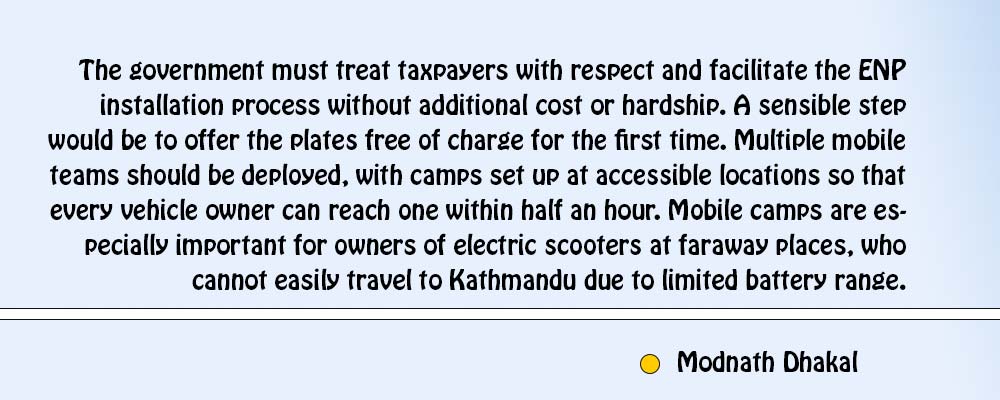


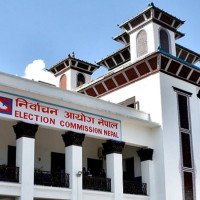
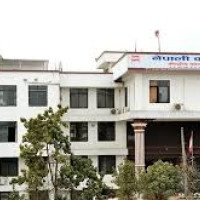
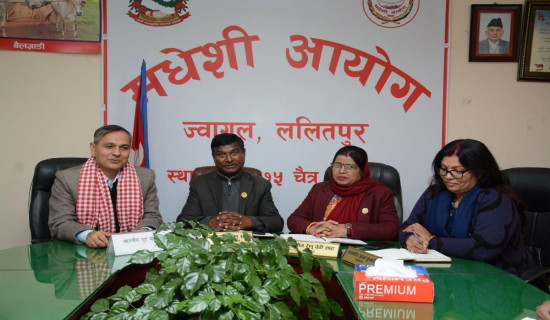
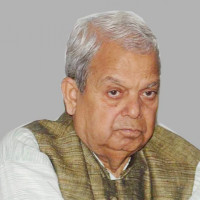





-original-thumb.jpg)



